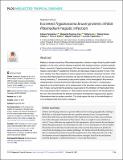Files in this item
Excreted Trypanosoma brucei proteins inhibit Plasmodium hepatic infection
Item metadata
| dc.contributor.author | Temporão, Adriana | |
| dc.contributor.author | Sanches-Vaz, Margarida | |
| dc.contributor.author | Luís, Rafael | |
| dc.contributor.author | Nunes-Cabaço, Helena | |
| dc.contributor.author | Smith, Terry K. | |
| dc.contributor.author | Prudêncio, Miguel | |
| dc.contributor.author | Figueiredo, Luisa M. | |
| dc.date.accessioned | 2021-11-18T16:30:09Z | |
| dc.date.available | 2021-11-18T16:30:09Z | |
| dc.date.issued | 2021-10-29 | |
| dc.identifier | 276565179 | |
| dc.identifier | 16047ee6-7a1c-4abb-afeb-e3f794fddf6b | |
| dc.identifier | 85118950424 | |
| dc.identifier | 000715222100002 | |
| dc.identifier.citation | Temporão , A , Sanches-Vaz , M , Luís , R , Nunes-Cabaço , H , Smith , T K , Prudêncio , M & Figueiredo , L M 2021 , ' Excreted Trypanosoma brucei proteins inhibit Plasmodium hepatic infection ' , PLoS Neglected Tropical Diseases , vol. 15 , no. 10 , e0009912 . https://doi.org/10.1371/journal.pntd.0009912 | en |
| dc.identifier.issn | 1935-2735 | |
| dc.identifier.other | RIS: urn:348DFC9B4440C9A643999F43B8788E7C | |
| dc.identifier.uri | https://hdl.handle.net/10023/24361 | |
| dc.description | Funding: This work was supported by the Howard Hughes Medical Institute (ref. 55007419) awarded to LMF, by Fundac¸ão para a Ciência e Tecnologia (PD/ BD/138891/2018) awarded to AT, (PD/BD/ 105838/2018) awarded to MSV, (CEECIND/03322/ 2018) awarded to LMF, (CEECIND/03539/2017) awarded to MP, and by the Wellcome Trust (094476/Z/10/Z) awarded to TKS. | en |
| dc.description.abstract | Malaria, a disease caused by Plasmodium parasites, remains a major threat to public health globally. It is the most common disease in patients with sleeping sickness, another parasitic illness, caused by Trypanosoma brucei. We have previously shown that a T. brucei infection impairs a secondary P. berghei liver infection and decreases malaria severity in mice. However, whether this effect requires an active trypanosome infection remained unknown. Here, we show that Plasmodium liver infection can also be inhibited by the serum of a mouse previously infected by T. brucei and by total protein lysates of this kinetoplastid. Biochemical characterisation showed that the anti-Plasmodium activity of the total T. brucei lysates depends on its protein fraction, but is independent of the abundant variant surface glycoprotein. Finally, we found that the protein(s) responsible for the inhibition of Plasmodium infection is/are present within a fraction of ~350 proteins that are excreted to the bloodstream of the host. We conclude that the defence mechanism developed by trypanosomes against Plasmodium relies on protein excretion. This study opens the door to the identification of novel antiplasmodial intervention strategies. | |
| dc.format.extent | 28 | |
| dc.format.extent | 2776141 | |
| dc.language.iso | eng | |
| dc.relation.ispartof | PLoS Neglected Tropical Diseases | en |
| dc.subject | QR Microbiology | en |
| dc.subject | RB Pathology | en |
| dc.subject | NDAS | en |
| dc.subject | SDG 3 - Good Health and Well-being | en |
| dc.subject.lcc | QR | en |
| dc.subject.lcc | RB | en |
| dc.title | Excreted Trypanosoma brucei proteins inhibit Plasmodium hepatic infection | en |
| dc.type | Journal article | en |
| dc.contributor.sponsor | The Wellcome Trust | en |
| dc.contributor.institution | University of St Andrews. School of Biology | en |
| dc.contributor.institution | University of St Andrews. Sir James Mackenzie Institute for Early Diagnosis | en |
| dc.contributor.institution | University of St Andrews. Biomedical Sciences Research Complex | en |
| dc.identifier.doi | 10.1371/journal.pntd.0009912 | |
| dc.description.status | Peer reviewed | en |
| dc.identifier.grantnumber | 094476/Z/10/Z | en |
This item appears in the following Collection(s)
Items in the St Andrews Research Repository are protected by copyright, with all rights reserved, unless otherwise indicated.

